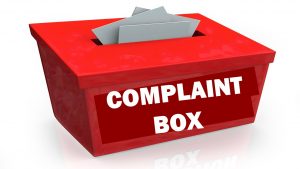This post will either resonate with you or seriously peeve you off: Do you think we complain too much or too little?
The jury is still out on whether or not South Africans complain too much or too little about the state of our country or the violation of our rights by government or its agencies, or by businesses which deliver terrible products and services or which otherwise treat people appallingly.
Some say we’re way too complacent and don’t complain enough, others say we are a bunch of moaners, constantly nit-picking everything. There are those who moan around the braai fires or the dinner table but don’t do anything to press their rights when and where it really matters.
I’m happy to acknowledge that I take my rights seriously and will argue the toss with anyone who dares to violate or abuse the rights I enjoy in any respect anywhere in the world but especially in our country, whether as a citizen, a consumer, a resident, a motorist, even a walker on the beach.
But, my perception is that South Africans don’t complain easily about government agencies, businesses or professionals who take us for moegoes, let alone those who seriously take our money for a ride.
Apparently, it’s not de rigueur to expect exacting standards of the service providers and product suppliers on whom we depend for all our daily needs. We should instead, simply pay over hard-earned cash without any expectation that we will get what we have paid for and be treated decently in the process.
I don’t think I’m over-generalising in my assertion that this non-expectation is probably more of a South African approach than in the make-up of people in other parts of the world.
And it’s definitely a South African business ethic to treat your customers as if they are just a blot on your day, that they don’t deserve good products or services, courtesies or quotations, call-backs or updates; that you can simply ignore their complaints about legitimate issues, or somehow acknowledge them while proceeding to downplay the issue or, worse, wear out the complainant with inane, meaningless, arse-saving platitudes.
The ubiquitous call centre – the ostensible “best practice” tool the company employed at considerable cost some years ago – will block your efforts to tell someone how their business really sucks and needs improvement in this or that particular area. No matter how hard you try, you mostly won’t get to deal with a real person. Instead, you’ll have the pleasure of engaging with digital personae as in: “Please do not reply to this email as it is an automated response.” And when you do get a real person, it will be a low-level outsourced call centre operator running through a script after picking up your call after it went on a global rondomtalie.
The bosses who are actually employed by the business – from junior managers to executives – and the individuals who sit on boards and similar oversight bodies, are happily cocooned in anonymity and blamelessness far from their customers.
Businesses in many other countries also have solid policies and use approaches like call centres for deflecting difficult customers, but they would never get away with treating their customers and potential clients as shabbily as South African businesses – big and small – treat us every day.
Government is no different – whether you’re dealing with a department, state-owned company or agency at national, provincial or local levels. I’ve argued before here https://wordpix.co.za/sars-revisiting-problems-at-taxman/ how the SA Revenue Service has long given up its distinction of being the best-performing government entity. Apart from the agency’s complicity in the State capture shenanigans, it has made a virtue of treating tax payers abysmally. It’s their way or the highway.
Ellen Roseman http://blog.ellenroseman.com/?p=825 has written about the stupidity of businesses which don’t take customer complaints seriously. “Companies pay handsomely for the kind of research that dissatisfied customers provide for free. But some people just get a brush-off because they can’t reach corporate managers who take such input seriously. And even if they do, they’re given vague assurances about having their complaints reviewed.”
Of course, we – customers, consumers, clients, members, owners – get things wrong too, sometimes horribly so. I have made enough mistakes in my interactions with businesses to know that “to err is human”. It’s about how you correct your mistake, though.
This is the start of a series of stories on complaints, about some of the things that not only peeve us off, but that are patently illegal or unethical. It points out grossly inappropriate business practices and calls out lame excuses hauled out.
The stories are also very personal, reflecting my experiences of bad service. Understandably, one of the sectors I’ve had the pleasure – or mis-fortune – of directly interacting with is healthcare, where I call out a list of inappropriate actions.
At times I consciously name individuals and businesses whose practices leave much to be desired and with whom I have no intention of ever again doing business – within reason and legal obligations, of course. Obviously, I’ve had to be cautious in my criticism, because sometimes either the law is skewed or our options are limited if we want to use alternative service providers to the ones who abuse us. (“Don’t bite the hand…” and all that.)
Sometimes, we also need help in how and where we complain. So, I also look at what options are open to you if you have had bad service from a local business, from calling, writing a letter, boycotting, going onto social media, submitting to an ombud for the business or industry.
The entire series is available on my blog www.wordpix.co.za. Drop by and comment on the blog page. Share your experience here or in a private message to me via email www.wordpix.co.za/contact-me/. Click the “Subscribe” button to receive updates on this series or other topics.
